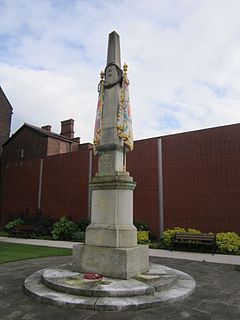Lancashire Fusiliers War Memorial
| Lancashire Fusiliers War Memorial | |
|---|---|
| United Kingdom | |
 |
|
| For men of the Lancashire Fusiliers killed in the First World War | |
| Unveiled | 25 April 1922 |
| Location |
53°35′32″N 2°17′55″W / 53.592234°N 2.298722°WCoordinates: 53°35′32″N 2°17′55″W / 53.592234°N 2.298722°W Gallipoli Gardens, Bury, Greater Manchester |
| Designed by | Sir Edwin Lutyens |
|
Listed Building – Grade II*
|
|
| Official name | War Memorial to the Lancashire Fusiliers, Gallipoli Gardens |
| Designated | 2 September 1992 |
| Reference no. | 1250814 |
The Lancashire Fusiliers War Memorial is a First World War memorial dedicated to members of the Lancashire Fusiliers, located in Gallipoli Gardens in Bury, Greater Manchester (historically in Lancashire), in north-west England. Unveiled on 25 April 1922, the memorial was designed by Sir Edwin Lutyens and is now a grade II* listed building.
In the aftermath of the First World War and its unprecedented casualties, thousands of war memorials were built across Britain. Amongst the most prominent designers of memorials was the architect Sir Edwin Lutyens, described by Historic England as "the leading English architect of his generation". Lutyens designed the Cenotaph on Whitehall in London, which became the focus for the national Remembrance Sunday commemorations, as well as the Thiepval Memorial to the Missing—the largest British war memorial anywhere in the world—and the Stone of Remembrance which appears in all large Commonwealth War Graves Commission cemeteries and in several of Lutyens' civic war memorials. As well as civic memorials, Lutyens designed multiple war memorials for private companies and individual regiments; he also designed Rochdale Cenotaph, some seven miles away.
The Lancashire Fusiliers lost 13,642 men during the First World War, particularly during the Gallipoli Campaign; the regiment participate in the landing at Cape Helles during which its members famously earned "six Victoria Crosses before breakfast". Lutyens was chosen as the architect for the memorial due to his family connection to the Lancashire Fusiliers—his father and great uncle had both fought in the regiment—and he gave his services pro bono.
...
Wikipedia
